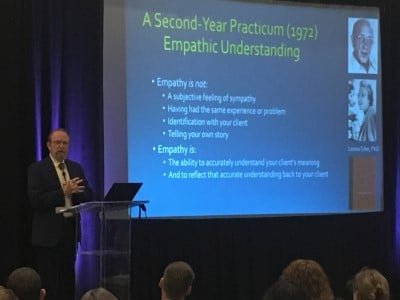When you want to help your patients change you must listen with empathic understanding and acceptance.
Sound interesting? This is from Bill Miller’s—one of the founders of Motivational Interviewing-- recent presentation at the International Conference on Motivational Interviewing. CIPC Director, Daniel Mullin, regularly attends and presents at these international conferences, which are attended by a mix of educators, researchers, and consultants.

Dan generously shares with us highlights of this international gathering from his notes:
Tim Apodaca presented on Components of Motivational Interviewing encounters. His research finding that, “asking patients to spend time imagining a future in which they are healthy will frequently lead to more change talk” doesn’t surprise me. When meeting with heroin users who are entering treatment, I frequently begin by asking, “If treatment is going well, how do you want your life to be different in 6 months? What are you hoping for?” Establishing a counseling relationship by discussing a healthy future not only seems to help with treatment engagement, it also helps with outcome.
April Carcone presented on research she has done with Sylvie Naar in caring for patients with HIV. She left me with the following thoughts for my practice: Respond to patients’ change talk by reflecting it and strengthening it with questions. Respond to patients’ sustain talk with empathy and an emphasis on autonomy. It is reassuring that this approach, which is a common theme in my advanced MI trainings, continues to be supported by those doing important research.
Denise Ernst, one of the co-authors of the Motivational Interviewing Treatment Integrity scale, presented on the “Client Self-Exploration Scale.” She began by reviewing the history of this measure back to students of Carl Roger’s, who did early and important research on the role of empathy in promoting change. Denise left me with the following takeaway: When clinicians provide empathy, patients are more likely to open up and more deeply explore their thoughts and feelings, and that self-exploration is associated with more healthy change.
A highlight of the conference was the hour long presentation by MI co-developer, Bill Miller.

His presentation was entitled Motivational Interviewing and the Clinical Science of Carl Rogers. Dr. Miller shared his comprehensive knowledge about the work of Carl Rogers, first by discussing the ways in which Rogers pioneered the process of listening to recordings of psychotherapy sessions in the 1940s. Rogers pushed for a focus on the science of psychotherapy and he worked to link patient outcomes to specific observations that could be made in counseling encounters. He encouraged us all to spend more time listening to recordings of our work with patients. A few additional notes from Dr. Miller that will stay with me:
- Giving people a low empathy counselor is worse than no treatment at all;
- If you resist your patient, they will resist change;
- Don’t get ahead of a patient’s readiness for change;
- When you want to help your patients change you must listen with empathic understanding and acceptance; you must nurture hope and optimism
- MI must be compassionate - “The goal is to alleviate the other person’s suffering”;
- In most studies, the biggest predictor of outcome is the counselor you are assigned, not the brand of treatment you receive
- And finally, MI training must include “Workshop + Feedback + Coaching” This is the only known approach to MI training that results in improved patient outcomes.
Want to share your thoughts?
Joun our vibrant online community!
Twitter Facebook

